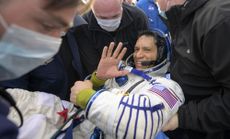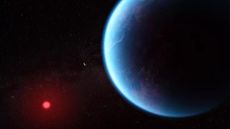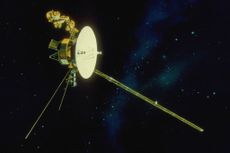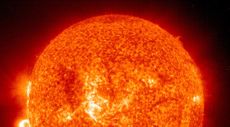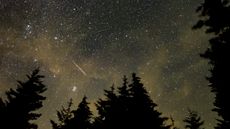Asteroid sample on way to Earth may help answer Big Bang questions
Capsule of dust from Bennu will probably show signs of water and carbon: the building blocks of life
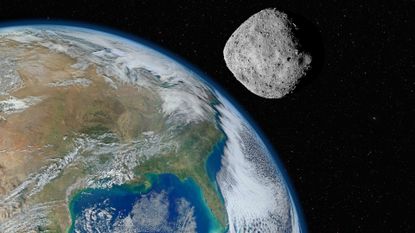
A free daily digest of the biggest news stories of the day - and the best features from our website
Thank you for signing up to TheWeek. You will receive a verification email shortly.
There was a problem. Please refresh the page and try again.
Material from an asteroid will "come screaming into Earth's atmosphere on Sunday at more than 15 times the speed of a rifle bullet" – but it has all been planned by space scientists, who hope it will answer some of their biggest questions.
Nasa's spacecraft Osiris-Rex will send a small capsule back to Earth carrying a "precious cargo", said BBC News: a "handful" of dust and rock weighing just 250g from a nearby asteroid, Bennu.
The capsule will enter the Earth's atmosphere before drifting to the ground in the Utah desert by parachute. The sample "promises to inform the most profound of questions: where do we come from?", said the broadcaster.
Subscribe to The Week
Escape your echo chamber. Get the facts behind the news, plus analysis from multiple perspectives.

Sign up for The Week's Free Newsletters
From our morning news briefing to a weekly Good News Newsletter, get the best of The Week delivered directly to your inbox.
From our morning news briefing to a weekly Good News Newsletter, get the best of The Week delivered directly to your inbox.
It will contain "material that existed before our planet, maybe even some grains that existed before our Solar System", said Dante Lauretta, the principal investigator on the mission. "We're trying to piece together our beginnings. How did the Earth form and why is it a habitable world? What is the source of the organic molecules that make up all life on Earth?"
Researchers are interested in the 500-metre-wide Bennu because it appears to be "rich in carbon", an element that underpins all life on Earth, and contains traces of water, "another vital ingredient".
Scientists are also interested "for a more immediately relevant reason": self-preservation. Bennu is regarded by Nasa as one of the most dangerous items in the solar system, with about a 1 in 1,750 chance of it colliding with Earth by 2300. Characterising asteroids would help "work out how a looming impact might be averted".
By the time scientists have analysed the material from Bennu, "it is unlikely that any aspect of its formation, evolution and orbital history, composition and components will be unknown", wrote Monica Grady for The Conversation. This will allow an effective “Earth rescue” mission to be launched.

Continue reading for free
We hope you're enjoying The Week's refreshingly open-minded journalism.
Subscribed to The Week? Register your account with the same email as your subscription.
Sign up to our 10 Things You Need to Know Today newsletter
A free daily digest of the biggest news stories of the day - and the best features from our website
Harriet Marsden is a writer for The Week, mostly covering UK and global news and politics. Before joining the site, she was a freelance journalist for seven years, specialising in social affairs, gender equality and culture. She worked for The Guardian, The Times and The Independent, and regularly contributed articles to The Sunday Times, The Telegraph, The New Statesman, Tortoise Media and Metro, as well as appearing on BBC Radio London, Times Radio and “Woman’s Hour”. She has a master’s in international journalism from City University, London, and was awarded the "journalist-at-large" fellowship by the Local Trust charity in 2021.
-
 Ben Fountain's 6 favorite books about Haiti
Ben Fountain's 6 favorite books about HaitiFeature The award-winning author recommends works by Marie Vieux-Chauvet, Katherine Dunham and more
By The Week Staff Published
-
 6 picturesque homes in apartments abroad
6 picturesque homes in apartments abroadFeature Featuring a wall of windows in Costa Rica and a luxury department store-turned-home in New Zealand
By The Week Staff Published
-
 Why 2023 has been the year of strikes and labor movements
Why 2023 has been the year of strikes and labor movementsThe Explainer From Hollywood to auto factories, workers are taking to the picket lines
By Justin Klawans Published
-
 Astronauts return after circling Earth thousands of times while stuck in space
Astronauts return after circling Earth thousands of times while stuck in spaceSpeed read The astronauts were stranded on the International Space Station after their return capsule was hit by space junk
By Sorcha Bradley, The Week UK Published
-
 K2-18b: the exoplanet that could have signs of life
K2-18b: the exoplanet that could have signs of lifeThe Explainer Scientists may have discovered evidence of farts from alien marine creatures 120 light years away
By Arion McNicoll Published
-
 NASA loses contact with Voyager 2 probe
NASA loses contact with Voyager 2 probeSpeed Read
By Devika Rao Published
-
 Will a solar storm wreak havoc on the internet?
Will a solar storm wreak havoc on the internet?Speed Read Tales of a Wi-Fi doomsday have been spreading across social media in recent weeks
By Brigid Kennedy Published
-
 Biden keeps U.S. Space Command in Colorado, reversing Trump move to Alabama
Biden keeps U.S. Space Command in Colorado, reversing Trump move to AlabamaSpeed Read
By Peter Weber Published
-
 Northern lights expected to be visible in 17 states on Thursday
Northern lights expected to be visible in 17 states on ThursdaySpeed Read
By Catherine Garcia Published
-
 Scientists find evidence of gravitational waves warping space-time throughout the cosmos
Scientists find evidence of gravitational waves warping space-time throughout the cosmosSpeed Read
By Peter Weber Published
-
 The biggest upcoming celestial events to watch in 2023
The biggest upcoming celestial events to watch in 2023In Depth Meteor showers, eclipses and more are coming to the skies
By Devika Rao Last updated



